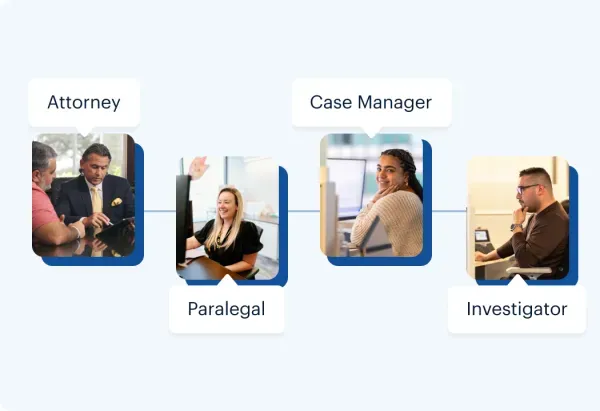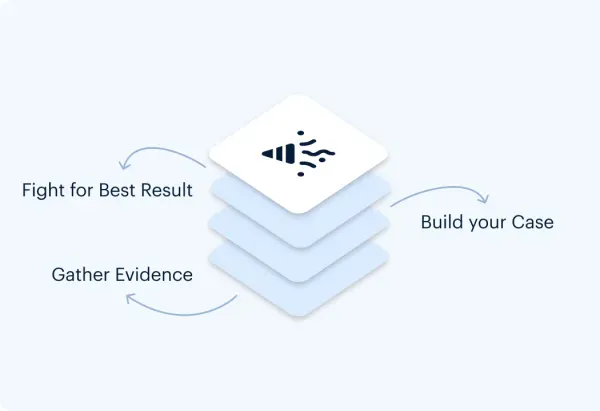Morgan & Morgan Boston, LLC. Results may vary depending on your particular facts and legal circumstances. The attorney featured above is licensed in Florida. For a full list of attorneys in your state please visit our attorney page.
PROVIDENCE INSURANCE ATTORNEY
Insurers sometimes delay, underpay, or deny valid claims. We fight to get what you deserve.
Morgan & Morgan Boston, LLC. Results may vary depending on your particular facts and legal circumstances. The attorney featured above is licensed in Florida. For a full list of attorneys in your state please visit our attorney page.
Providence Insurance Attorney
When you find yourself navigating the complex world of insurance claims alone, it's easy to get overwhelmed by piles of time-sensitive paperwork, endless back-and-forth phone calls with arrogant adjusters, and piling bills. At Morgan and Morgan, we understand your pain, and that stems from over three decades of dealing with insurance companies from all corners of the country.
Rhode Island insurance laws prohibit insurers from acting in bad faith. But despite that, some of these companies constantly break the law, denying eligible individuals the insurance benefits they deserve. If that's what you or your loved one is dealing with, contact Morgan and Morgan today for a free case evaluation. We might be able to assign a skilled insurance lawyer in Providence to your case and hold the insurance company accountable.
150,000+ Five Star Reviews
The reasons why clients trust Morgan & Morgan.
Results may vary depending on your particular facts and legal circumstances. Based on select nationwide reviews.
Our Results
How It Works
Unsure what to do next? With 35 years of experience, our personal
injury lawyers will guide you every step of the way.

Contact Us 24/7 - It’s Free
Start your claim

Meet your dedicated attorney
Meet the attorneys

We fight for more
Learn more about the case process
Results may vary depending on your particular facts and legal circumstances. The attorneys shown in these photos may not be licensed in your state. To find an attorney licensed in your area, please visit our attorney page.
Local Care
Backed by America’s Largest Injury Law Firm.
$30 Billion
Recovered for clients
nationwide700,000+
Clients and families
served1,000+
Attorneys across
the country1
Click may change your life
The attorney featured above is licensed in Florida. For a full list of attorneys in your state please visit our attorney page.
Results may vary depending on your particular facts and legal circumstances.
Learn More
Injured and not sure what to do next?
We'll guide you through everything you need to know.
Bad Faith Insurance Explained
The phrase "bad faith," in the world of insurance, refers to an unethical or unfair practice by an insurance company when dealing with policyholders or individuals entitled to compensation through the policyholder's insurance.
In this context, "bad faith" occurs when an insurance company fails to fulfill its obligations to the eligible party honestly and reasonably. Instead of acting in the best interest of the policyholder or any other individual eligible for compensation through the insurer, the company may prioritize its own interests, such as maximizing profits or minimizing insurance payouts.
Insurance companies in Providence and throughout Rhode Island have a legal duty to act in good faith. In other words, they should handle claims promptly, fairly, and honestly, but the reality is that some of these companies have no respect for the law.
So when an insurer fails to meet these standards and engages in bad faith practices, you may be entitled to take legal action and seek appropriate compensation.
Common Signs of Bad Faith Insurance
While insurance companies are notorious for acting in bad faith, the specifics of that particular scenario will ultimately determine whether or not they broke the law.
You may have a valid bad faith insurance claim if:
- The insurance company unreasonably prolongs the claims process without valid justification.
- The insurer fails to thoroughly investigate a claim or ignores relevant evidence.
- The insurance company unreasonably undervalues or underestimates the damages or losses the policy covers.
- The insurer provides false information, misrepresents policy provisions, or deceives policyholders to deny or minimize claims.
- The insurance company fails to honor the terms and conditions of the insurance policy without a valid reason.
What To Do if an Insurance Company Acts in Bad Faith
The first thing you need to do is document all interactions you had with the insurance company. These include but are not limited to phone calls, emails, letters, and any other communication regarding your claim. This information could help prove the insurer's actions and support your case against them.
Make sure you review the terms and conditions of your insurance policy to understand what you're entitled to. This step helps identify any discrepancies or unfair denials by the insurance company. It can also establish whether the insurance company was justified in its actions.
When dealing with the insurance company, make sure that any communication you have with them is traceable. For example, it's best to communicate in writing as much as possible. This helps create a paper trail that could prove critical to your case further down the road.
If the insurance firm has denied your claim or provided an inadequate response, you should seek clarification, preferably in writing. Whatever information you obtain from them as a response to your questions can help determine whether their actions are justified or if they are acting in bad faith.
Importantly, you should consult an experienced bad faith insurance attorney to evaluate your case. The attorney will establish whether you have a valid claim and how best to approach such a case.
How a Providence Bad Faith Insurance Lawyer Can Help
A skilled bad faith insurance lawyer can help protect your rights, ensuring that you obtain a fair resolution. But that's just an overview of their primary role in such cases.
Let's dig into the details.
Since such an attorney specializes in insurance law, they can navigate the complex issues that often arise when dealing with insurance companies. For example, they know the various tactics insurers use to delay or deny claims, sometimes leaving the claimant with no other option but to settle for less than they deserve.
But things shouldn't get to that point when you have a lawyer in your corner.
The attorney will evaluate the details of your case and analyze relevant insurance laws in Rhode Island to determine if the company's actions indeed constitute bad faith. This step aims to help you understand the strength of your case and the potential legal options available to you if determined that the insurance company acted out of bad faith.
It is not surprising that insurance companies often respond differently when dealing with a lawyer. That's because they know that attorneys are familiar with the law.
Hiring a bad faith insurance lawyer means letting them handle all communication with the insurer on your behalf. In return, the insurance company will not have the time or opportunity to play games with your claim. They know that these attorneys will hold them accountable for their actions if they fail to cooperate.
In such cases, simply believing that the insurance company is acting in bad faith is not enough. Although you may be right theoretically, you must back your claim with evidence.
One of the biggest challenges many claimants face is identifying the kind of evidence that could be used to establish the insurance company's bad faith practices. That's because building a strong case requires collecting relevant evidence to support your claim. A skilled and well-equipped lawyer understands the kind of evidence that could add more weight to your case and what is likely to be dismissed by the judge or jury.
Besides solid evidence, you need a proper legal strategy to even stand a chance of taking on the insurance company in or out of court. Keep in mind that these companies make millions of dollars every year and can afford some of the best defense attorneys to fight for them, especially in claims involving huge amounts of compensation.
But that shouldn't intimate you, especially when you have a bad faith insurance lawyer from Morgan and Morgan, the nation's largest and most powerful injury firm. The lawyer will develop a legal strategy to pursue the insurance claim you are eligible for and represent your interests in any negotiations with the insurer.
Sometimes, negotiations work. Other times, they don't. That's a fact our attorneys have made peace with and are always prepared to take the right and necessary actions to protect the rights and interests of our clients.
In the not-so-uncommon scenario that a settlement cannot be reached through negotiation with the insurance provider, we can file a lawsuit against them and represent you in court. We'll then handle all aspects of the litigation process, including but not limited to drafting legal documents, presenting arguments to support your case against the insurance company, and advocating for your rights before a judge or jury.
What Damages Can I Recover in a Bad Faith Insurance Lawsuit?
Insurance law in Rhode Island is very clear on such cases; depending on the specifics of the case, claimants can recover financial losses incurred, such as medical expenses, property damage, or lost wages. Also, if the insurance company's bad faith caused you significant emotional distress, you may be able to seek compensation for the resulting mental anguish, anxiety, or other emotional harm.
Am I Entitled to Punitive Damages In a Bad Faith Insurance Lawsuit?
Yes, you may also be awarded punitive damages, which are meant to punish the insurance company for their bad faith conduct and deter similar behavior in the future. Punitive damages are typically only awarded if the case goes to court and the judge or jury rules that the insurer's actions were particularly egregious or demonstrated a willful disregard for your rights.
Who Pays the Attorney Fees In a Bad Faith Insurance Lawsuit?
You won't have to worry about attorney fees if you win your insurance lawsuit. The insurance company may be required to settle these fees and other litigation costs incurred throughout the legal process. On the other hand, if the case settles before going to court, a small percentage of the settlement (usually between 30 to 40 percent) will go into settling attorney fees and other legal expenses in what is known as a contingency payment system.
Let Us Handle Your Bad Faith Insurance Case
When confronting an insurance company for acting in bad faith, you should be armed with knowledge of the law, powerful legal resources, and experience. Always keep in mind that these companies can afford defense attorneys to represent them. So it's not just a matter of getting any insurance lawyer in Providence to represent you; you need a legal professional who is not afraid to go to court and has powerful legal resources to back them up. That's where we come in as America's largest and most injury firm with a solid history of taking on the biggest players in the insurance industry. Not once, not twice, but countless times.
Tell us about your case today. If you have valid grounds to take legal action, we'll ensure that insurance companies don't avoid their financial responsibility of compensating you by acting in bad faith. If they do, they'll pay a heavy price.
Sources:










